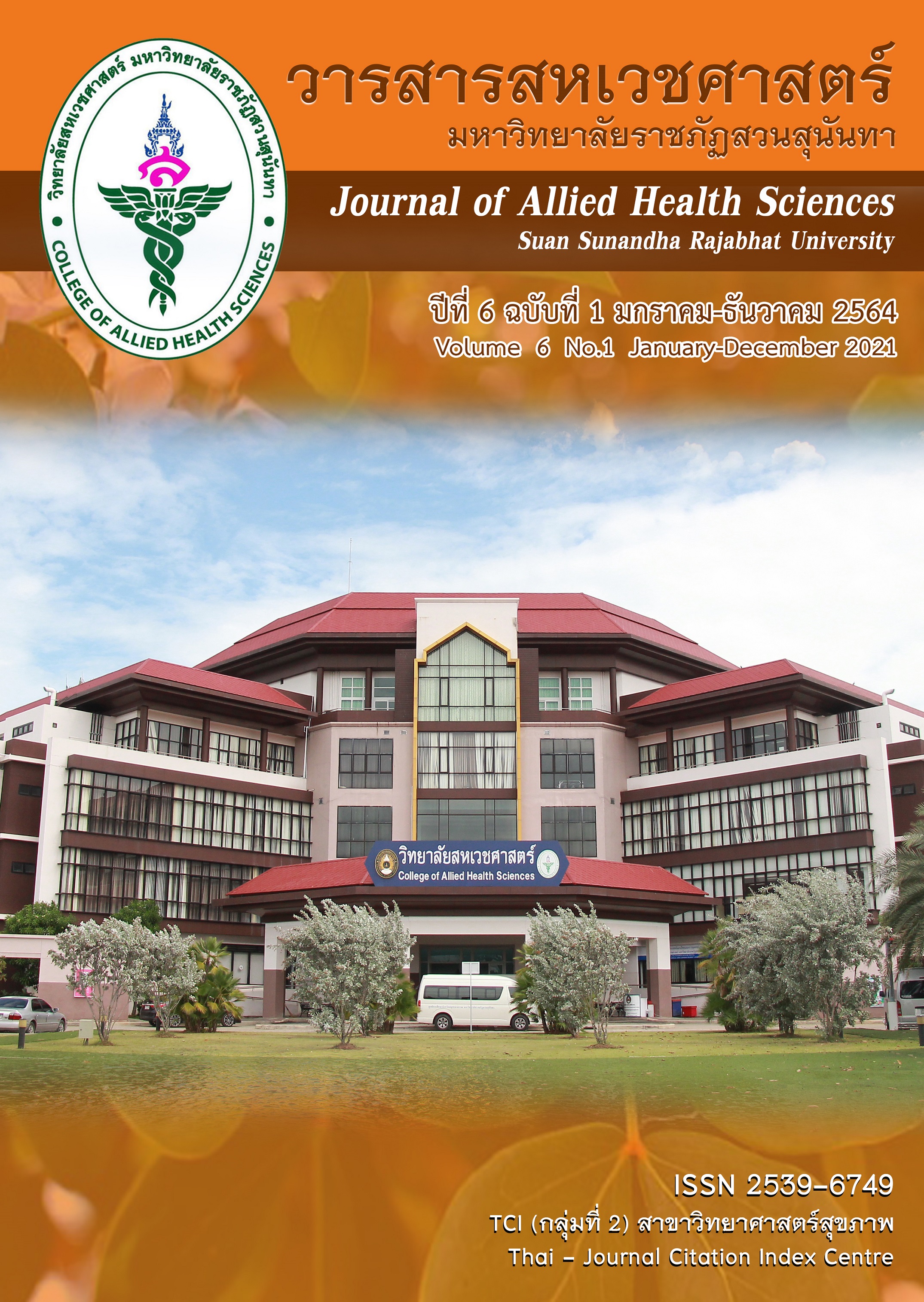การพัฒนาโปรแกรมการเรียนรู้เพื่อสร้างเสริมทักษะการปฏิเสธเครื่องดื่มแอลกอฮอล์ ในนักศึกษาระดับอาชีวศึกษา มหาวิทยาลัยนครพนม Development of Learning Programs to Improve Drink Refusal Skills in Vocational School Students, Nakhon Phanom University
Main Article Content
บทคัดย่อ
การวิจัยครั้งนี้ มีวัตถุประสงค์เพื่อพัฒนาโปรแกรมการเรียนรู้เพื่อสร้างเสริมทักษะการปฏิเสธเครื่องดื่มแอลกอฮอล์ ทำการศึกษา 2 ระยะ ระยะที่ 1 ประชากรในการศึกษาครั้งนี้คือ นักศึกษาระดับประกาศนียบัตรวิชาชีพ มหาวิทยาลัยนครพนม จำนวน 54,312 คน สุ่มตัวอย่างได้ 420 คน ด้วยวิธีการสุ่มตัวอย่างอย่างง่าย เก็บข้อมูลโดยใช้แบบสอบถาม เพื่อสำรวจพฤติกรรมการบริโภค ทักษะการปฏิเสธ และปัจจัยที่มีผลต่อ
การบริโภคเครื่องดื่มแอลกอฮอล์ ทำการวิเคราะห์หาปัจจัยทำนายทักษะการปฏิเสธ โดยใช้สถิติ สหสัมพันธ์
การถดถอยเชิงพหุคูณ ระยะที่ 2 นำข้อค้นพบมาใช้ในมาพัฒนาโปรแกรมการเรียนรู้ ผลการวิจัยพบว่า
กลุ่มตัวอย่างเคยดื่มเครื่องดื่มที่มีแอลกอฮอล์ ร้อยละ 70.0 มีพฤติกรรมการดื่มเครื่องดื่มแอลกอฮอล์ในระดับ
มีความเสี่ยง ร้อยละ 42.8 มีคะแนนทักษะการปฏิเสธเครื่องดื่มแอลกอฮอล์ อยู่ในระดับปานกลาง (28.2±8.09) การวิเคราะห์สัมประสิทธิ์สหสัมพันธ์ พบตัวแปรที่มีความสัมพันธ์ทางบวกจำนวน 4 ค่า ได้แก่ ความรู้ ค่านิยม ทัศนคติ และปัจจัยด้านเวลา มีค่าสัมประสิทธิ์สหสัมพันธ์ 0.656, 0.295 , 0.194 และ 0.209 ตามลำดับ
(p <0.0001) และมีความสัมพันธ์กันทางลบ จำนวน 3 ค่า ได้แก่ ปัจจัยด้านเศรษฐกิจ ปัจจัยด้านสังคม และปัจจัยด้านเวลา มีค่าสัมประสิทธิ์สหสัมพันธ์ 0.747, 0.217 และ 0.561 ตามลำดับ (p <0.0001) ปัจจัยที่มีผลต่อทักษะการปฏิเสธเครื่องดื่มแอลกอฮอล์ มี 6 ตัวแปร ได้แก่ ด้านเศรษฐกิจด้านสถานที่ ด้านสังคม ความรู้
เรื่องเครื่องดื่มแอลกอฮอล์ ค่านิยม และ เวลา สามารถร่วมกันพยากรณ์ทักษะการปฏิเสธเครื่องดื่มแอลกอฮอล์ ได้ร้อยละ 87 (R2 = 0.870, F = 7.209 และ P <0.001) มีค่าสัมประสิทธิ์สหสัมพันธ์พหุคูณเท่ากับ 0.933 ดังนั้น จึงได้สร้างเป็นโปรแกรมการเรียนรู้นำแนวคิด Two-Generation Approach และเพิ่มเติมกิจกรรมที่เกี่ยวข้องกับปัจจัยที่มีอิทธิพลเข้าไปด้วย จากนั้นจัดทำเป็นคู่มือเพื่อนำเสนอต่อหน่วยงานที่เกี่ยวข้องต่อไป
The objective of this research was to develop the learning program to improve drink refusal skills. The research was divided into two phases - Phase 1: the population was 54,312 vocational certificate students at Nakhon Phanom University. Of all, 420 samples were randomized
and surveyed by a questionnaire which was to examine alcohol drinking behavior, drink refusal skills, and factors that affect alcohol consumption. Data analysis was done by multiple regression to find out the factors that can predict drink refusal skills. Followed by, Phase 2 referred to the findings
to develop the learning program. The research revealed that samples used to drink alcohol with
an alcohol content of 70%, drinking behavior was at a Hazardous drinking level (42.8%), drink refusal skills score was at a medium level (28.2±8.09). Besides, the results of a Multiple Regression Analysis found four positive predictive value of factors - knowledge, values, attitude, and time factor with
the indicated value of 0.656, 0.295, 0.194, and 0.209 respectively (p <0.0001), and three negative predictive value of factors – economic, social, and time with the value of multiple correlation coefficient 0.747, 0.217, and 0.561 respectively (p <0.0001). The results proved that six factors associated with drink refusal skills consisted of economic, place, social, knowledge of alcohol, value, and time with 87 prediction of drink refusal skills (R2 = 0.870, F = 7.209 and P <0.001) The value
of multiple correlations was equal to 0.933 which can initiate the learning program, apply
the Two -Generation Approach, add on activities related to influenced factors, present to the related organization onwards.

